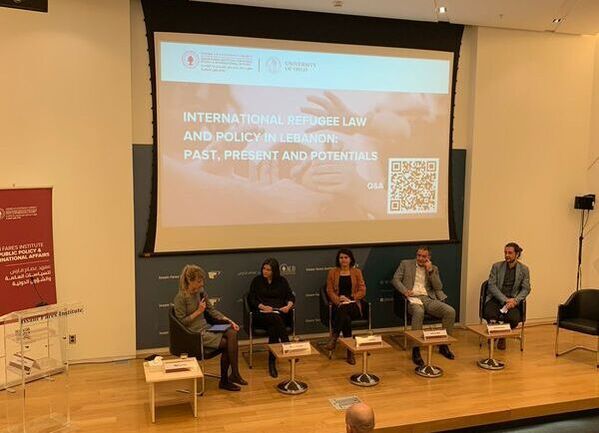Panel Discussion: “International Refugee Law and Policy in Lebanon: Past, Present and Potentials"3/16/2023
IFI, in collaboration with the University of Oslo, organized a panel discussion titled “International Refugee Law and Policy in Lebanon: Past, Present and Potentials” on March 16. The discussion explored the role of the international refugee regime’s norms and institutions in protecting refugees in Lebanon, Lebanon’s influence in developing such norms globally and regionally, as well as the consequences of non-ratification of the 1951 Refugee Convention and its 1967 Protocol for the protection of asylum seekers and refugees. Following opening remarks by IFI Assistant Director and Refugee Research and Policy Program Manager Yara Mourad, UNHCR representative in Lebanon Ivo Freijsen’s keynote speech began by addressing the challenges given Lebanon’s non-adherence to the 1951 Refugee Convention, even though it has greatly influenced refugee and human rights law. “There is a lot to be proud of in Lebanon when it comes to refugee response,” he said. "What we see globally and in the context of Syria-Lebanon, is that refugees do not decide to flee across international borders because of “generous aid packages” or other pull factors,” he added “but rather they flee because of urgent, critical and often life and livelihood threatening push factors in the country of origin." According to UNHCR, 90% of refugees currently live below the poverty line, with children increasingly being taken out of school to provide additional income and more desperate ones fleeing illegally. Around USD 9.6 billion has been given since 2015 in support of Syrian and Palestinian refugees, as well as Lebanese community and institutions and yet, “we count on the international community to keep supporting refugees and host countries,” Freijsen said.
A panel discussion gathered Ghida Frangieh - The Legal Agenda, Jihad Nammour - Saint Joseph University, Nadia Hardman - Human Rights Watch, and Richard Akiki - UNHCR, moderated by Maja Janmyr, University of Oslo and IFI Associate Fellow. Speakers overviewed the way the Lebanese government has dealt with the refugee crisis and asylum seekers, stressing that returns should be safe, dignified and voluntary. They agreed that the conditions are not in place in Syria, though difficult conditions and tight restrictions in Lebanon are pushing refugees to return. While Lebanon has implemented positive policies - such as opening borders for refugees - restrictions and shortcomings remain. In the meantime, support and sympathy towards refugees has shifted, mostly fueled by the economic crisis. Syrian refugees present in Lebanon temporarily must also be distinguished from Palestinian refugees. It’s time to rethink their situation, speakers agreed, and put all discrimination aside. Read Maya Janmyr’s Op-Ed on Lebanon’s role in setting the global norms and institutions of asylum and refugee protection here. Comments are closed.
|
Archives
April 2024
|

